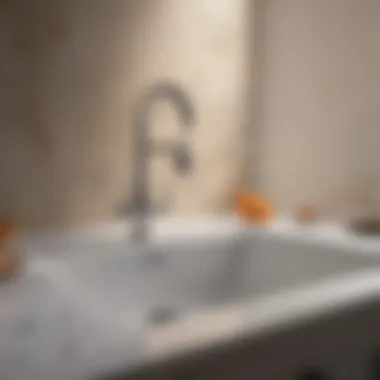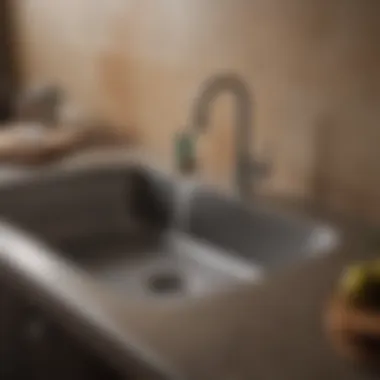Comprehensive Guide to Sink Blockage: Causes and Solutions


Intro
Sink blockages are a common issue in many households. They can disrupt daily routines and cause frustration if not addressed promptly. Blockages often occur due to various reasons, from improper disposal of waste to the natural buildup of grease and grime. This guide will delve into the causes of sink blockages, offering effective solutions and prevention strategies to keep your sinks functioning properly.
Understanding the significance of maintaining clear drains is crucial. Regular upkeep and timely interventions can save homeowners from costly repairs. Additionally, there might be times when professional help is necessary, especially with persistent issues. This article aims to provide a comprehensive perspective on managing sink blockages effectively.
Understanding Sink Blockage
Sink blockage is a common household issue that can disrupt daily activities and lead to various problems if left unaddressed. Understanding sink blockage helps homeowners, renters, and property managers take proactive steps to prevent, identify, and solve these issues effectively. This section outlines key elements related to sink blockages, highlighting their impact on plumbing systems and overall household functionality.
What is Sink Blockage?
Sink blockage refers to the obstruction of the water flow through a sink's drainage system. This blockage usually occurs when materials accumulate in the pipes, preventing water from draining away completely. Simple movements of debris, buildup of hair, and food particles contribute to the development of clogs. Over time, these materials can create significant barriers in the plumbing system, resulting in slow drainage or complete standstill of water in the sink.
When faced with a sink blockage, it is essential to understand its implications. Gains in knowledge can aid homeowners in avoiding a multitude of complications, like unpleasant odors and potential water damage.
Common Types of Sink Blockages
Several factors contribute to sink blockage, each representing unique challenges. Identifying common types of blockages can help users recognize symptoms early and take appropriate action before serious issues develop.
- Hair Accumulation: One of the most frequent offenders, hair can easily get trapped in sink drains. It often combines with soap residue, creating a dense mass that restricts water flow.
- Food Waste and Debris: In kitchens, food scraps, grease, and unwanted particles often enter the drain. They bind together, leading to substantial blockages that require immediate attention.
- Grease and Oil Build-up: Pouring grease down the sink is common but hazardous. As grease cools, it solidifies, forming a sticky substance that adheres to the pipe walls.
- Foreign Objects: Items accidentally dropped into the sink, such as utensils or small toys, can cause significant clogs. These may obstruct drainage and require specialized tools for extraction.
Recognizing the type of sink blockage is crucial for effective prevention and remediation.
Causes of Sink Blockage
Understanding the causes of sink blockage is crucial for effective management of this common plumbing issue. Each cause presents its own unique set of challenges, and recognizing them early can facilitate appropriate responses. Ultimately, knowing these causes leads to improved prevention strategies. This section will examine the primary elements contributing to sink blockages, providing insights vital for maintaining clear and efficiently functioning sinks.
Hair Accumulation
Hair can be a significant factor in sink blockages, particularly in bathroom sinks. Over time, strands of hair can gather in the drain, forming clumps that impede water flow. Such accumulation is often unnoticed until drainage issues arise. Regular cleaning of sink drains can help prevent hair from becoming trapped.
To mitigate this issue, consider using a drain cover or strainer. These products capture hair before it enters the plumbing system. Simple measures like brushing hair before using the sink can further reduce the amount of hair that makes its way into the drain.
Food Waste and Debris
In kitchen sinks, food waste and debris are leading causes of blockages. Small food particles, especially larger items, can accumulate in the pipes over time, leading to clogs. Disposing of waste properly is essential. Items like vegetable peels, rice, and pasta expand with water and create blockages.
Using a garbage disposal unit can help reduce this problem. However, it is key to know what can and cannot be processed through these systems. Even with a disposal, it is wise to minimize food waste going down the drain. For more thorough cleaning, regularly running hot water can help dissolve residual debris.
Grease and Oil Build-up
Grease and oil can cause significant blockage issues in sinks. When these substances are washed down the drain, they cool and solidify within the pipes. This buildup can trap other materials, exacerbating the blockage. Kitchen sinks are particularly susceptible due to cooking oils and fats.
To avoid this, never pour grease directly down the kitchen sink. Instead, let grease cool and place it in a sealed container, then discard it in the trash. A proactive approach includes occasionally flushing drains with hot boiling water or a mixture of baking soda and vinegar to help break down any minor greasy buildup.
Foreign Objects
Foreign objects often lead to unexpected sink blockages. Items like soap, paper, or toys can inadvertently end up in the sink, causing obstructions. While these events might seem innocuous, they can lead to serious plumbing issues if not attended to promptly.
Implementing preventive measures, like ensuring that children are monitored when near sinks, can reduce this risk. Furthermore, using sink screens and regularly inspecting sink drains will help catch such objects before they cause significant issues.
Conclusion: Understanding the various causes of sink blockages empowers homeowners to take preventive actions and address problems before they escalate. By being aware of these factors, proactive steps can lead to fewer blockages and reduced plumbing costs.
Symptoms of Sink Blockage


Recognizing the symptoms of sink blockage is crucial for timely intervention. Ignoring these signs can lead to severe plumbing issues and costly repairs. Knowing what to look for helps homeowners act quickly, minimizing inconvenience and expense. It is essential to be aware of common indicators that suggest your sink may be blocked. This guide outlines these key symptoms.
Slow Drainage
One of the most noticeable indicators of a blocked sink is slow drainage. If water takes longer than usual to drain, it could signal a buildup of debris. This congestion can be caused by hair, soap residue, or food particles. Addressing slow drainage early is important. The longer the blockage persists, the more complex and costly the solution may become.
Gurgling Sounds
Gurgling noises coming from your sink often indicates air trapped in the plumbing system. When there is a blockage, the normal flow of water is disrupted, causing air to escape through the drain. This sound can be frustrating but serves as an important alarm. If you hear these gurgling sounds, investigate the issue before it escalates.
Unpleasant Odors
Foul odors emanating from the sink can stem from stagnant water. Food particles and other organic debris may rot, leading to unpleasant smells. This not only alerts you to a blockage but also affects the overall hygiene of the kitchen or bathroom. It is advisable to identify the source of the odor and act quickly to eliminate potential health hazards.
Water Backflow
Water backflow represents one of the more serious symptoms of a blockage. This occurs when water cannot drain properly, and instead, it starts flowing back up the sink. It can lead to unsanitary conditions and serious plumbing problems. If your sink exhibits this symptom, it is essential to seek immediate solutions, as it suggests a significant blockage in the drainage system.
Recognizing the symptoms can be the difference between a simple fix and a larger plumbing disaster.
By being vigilant about these signs, homeowners can take proactive measures to maintain their sinks. It also helps avoid more severe issues down the line.
Immediate Solutions for Blocked Sinks
When faced with a blocked sink, it’s crucial to address the issue promptly. Immediate solutions can alleviate the problem quickly and effectively, preventing further complications. These methods not only clear the blockage but also provide insights into potential causes. Understanding these solutions is essential for homeowners and renters alike, since prolonged blockages can lead to more significant plumbing issues and expenses.
Using a Plunger
A plunger is often the first tool that comes to mind when dealing with a blockage. This common household item can effectively dislodge debris that might be obstructing the pipes. To use a plunger effectively:
- Seal the Overflow Drain: If your sink has an overflow drain, seal it with a wet cloth, ensuring no air escapes, which enhances suction.
- Position the Plunger: Place the plunger over the drain opening, ensuring it creates a good seal.
- Push and Pull: Use a steady push and pull motion. This should create pressure that helps dislodge the obstruction. Typically, this process takes a few minutes.
Keep the area around the sink clean to avoid any mess. If the blockage is removed, run hot water down the drain to ensure it flows freely.
Applying Baking Soda and Vinegar
Using baking soda and vinegar is a natural alternative to chemical cleaners. This method utilizes the effervescent reaction between these two substances to clean out the drain. Here's how to do it:
- Pour Baking Soda: Start by pouring about half a cup of baking soda directly into the drain.
- Add Vinegar: Follow it with a half-cup of vinegar. As they react, a bubbling action occurs, which can help break down smaller blockages.
- Wait: Allow this mixture to sit in the drain for about 30 minutes, then flush with hot water.
This method is not only eco-friendly but also effective for minor blockages caused by organic material.
Utilizing a Drain Snake
For more stubborn blockages, a drain snake is a practical solution. This tool reaches deeper into the pipes to eliminate clogs that a plunger or baking soda can't tackle. To use a drain snake:
- Insert into the Drain: Carefully insert the snake into the drain until you feel resistance.
- Twist and Push: Rotate the snake to grasp or break up the blockage.
- Pull Out the Debris: Once you feel it has gripped the blockage, gently pull it out with the snake.
This method often clears blockages related to hair and stubborn food remnants that have become lodged in the pipes.
Chemical Drain Cleaners: Pros and Cons
While chemical drain cleaners can prove effective, they come with advantages and disadvantages. Understanding these can help you make an informed choice.
Pros:
- Speed and Convenience: Chemical solutions often work quickly, breaking down obstructions in minutes.
- Accessibility: Available at most grocery and hardware stores, they are easy to obtain.


Cons:
- Potential Damage: Some chemicals can harm pipes, especially older ones.
- Environmental Concerns: Many chemicals contribute to pollution and can be hazardous in case of spills.
- Temporary Solutions: Often, these cleaners don't address the root cause of the blockage.
Long-Term Solutions for Sink Maintenance
Long-term solutions for sink maintenance are vital to ensure that sink blockages remain a rare occurrence. Implementing proactive strategies can save time and money in the long run. These solutions address the root causes of blockages while promoting an overall healthier plumbing system. Businesses and homeowners alike can benefit from understanding these methods, as prolonged sink use often leads to complications if not properly managed.
Regular Cleaning Routines
Establishing regular cleaning routines is essential for maintaining a clear sink. Cleaning helps remove food particles, hair, and soap scum that can accumulate over time. Set a schedule for cleaning your sink and its drain every few weeks. Use a mixture of hot water and dish soap to flush away buildup. A periodic deep clean involving baking soda and vinegar can also effectively break down stubborn blockages.
Benefits of regular cleaning include:
- Reduced odors: Foul smells often arise from stagnant waste.
- Improved drainage: Consistent cleaning prevents slow drains.
- Longevity of plumbing fixtures: Regular maintenance can prolong the life of your sink and pipes.
Installation of Drain Screens
Installing drain screens is a practical measure to prevent larger debris from entering the plumbing system. These screens act as a barrier, capturing food particles, hair, and any other choking materials before they can cause an obstruction. They are easily available in various sizes and can fit most sink drains.
Consider the following when choosing drain screens:
- Material: Opt for durable materials, such as stainless steel or heavy-duty plastic, to ensure longevity.
- Size: Choose screens that fit snugly in your sink’s drain to maximize effectiveness.
Avoiding Grease Disposal
Disposing of grease or oil down the sink is a leading cause of blockages. Over time, grease solidifies and adheres to the inside of pipes. It can trap other materials and create a significant blockage. To avoid this, use separate containers for grease disposal. This small change can significantly reduce the risk of future sink problems.
To minimize grease disposal issues:
- Use absorbent materials: Store grease in coffee grounds or kitty litter before disposal in a trash bag.
- Educate others in the household: Ensure everyone understands the importance of proper grease disposal.
Routine Professional Inspections
Routine professional inspections are an invaluable long-term solution for sink maintenance. By having a licensed plumber evaluate your plumbing system regularly, you can detect early signs of potential blockages. Plumbers can also provide insights on specific maintenance tasks tailored to your plumbing’s needs.
Key reasons for conducting professional inspections include:
- Expert assessment: Plumbers can identify underlying issues invisible to the untrained eye.
- Peace of mind: Knowing a professional has evaluated your system can reduce anxiety about unforeseen plumbing problems.
"Ignoring small issues can lead to bigger problems. Regular maintenance is the key to prevention."
When to Call a Professional Plumber
Sink blockages can be an everyday hassle, yet knowing when to seek professional help is crucial. There are times when personal attempts at fixing the problem might not suffice. Considering help from licensed plumbers can save time, prevent damage, and ensure the problem is effectively addressed.
Identifying Serious Blockages
Some blockages signify deeper issues within your plumbing system. If a blockage persists after typical remedies, it might indicate serious blockages. Watch out for signs such as:
- Multiple sinks backing up: This can show a more intricate plumbing problem that needs expert intervention.
- Water pooling in unexpected areas: Unusual water accumulation might suggest a major blockage or even a broken pipe.
- Recurring issues: If you regularly experience blockage, there may be underlying damages or issues that a professional must tackle.
In such cases, a professional plumber can conduct thorough inspections and determine if larger repairs are necessary.
Frequent Recurrences of Blockages


Experiencing repeated blockages is a clear sign that an expert should be contacted. If the same issues keep happening, it suggests more than just simple clogs. It may point to:
- Inadequate plumbing systems: Plumbing that cannot effectively handle the flow of debris or water suggests a need for system reevaluation.
- Improper installation: If pipes are not correctly fitted, blockages will likely happen often, leading to repairs.
- Root issues: Tree roots can invade pipes, causing serious problems that only professionals can rectify.
Repeated problems may greatly affect not just your sink, but the entire drainage system in your home.
Water Damage Concerns
When blockage leads to water backups, it can cause severe damage over time. Water damage is something that requires immediate professional attention. Here are some potential issues connected with water damage:
- Mold growth: Standing water can create a favorable environment for mold, which poses health risks.
- Structural damage: Continued leaks may compromise the integrity of your home, leading to high repair costs.
- Damage to belongings: Water from blocked sinks can ruin personal items like electronics or furniture, leading to expensive replacements.
In situations like these, hiring a professional plumber not only addresses the blockage but also helps to minimize any further damage to your property. It is vital to act quickly if you notice signs of water damage or related issues.
The Importance of Prevention
Preventing sink blockages is vital in maintaining a functional and healthy home environment. The significance of this topic extends beyond mere convenience, encompassing aspects of hygiene, cost-effectiveness, and overall property value. A blocked sink can lead to water damage, unpleasant odors, and even health hazards due to stagnant water and bacteria growth. Therefore, implementing effective preventive measures is crucial.
One of the primary benefits of prioritizing prevention is the mitigation of costly repairs. Regular maintenance can save homeowners money that might otherwise go toward fixing significant plumbing issues. For instance, a simple routine check can help catch hair and food particle accumulation before it turns into a serious blockage.
Additionally, prevention enhances the longevity of plumbing systems. Well-maintained pipes and drains are less susceptible to wear and tear. This proactive approach can help homeowners avoid emergencies and the disruptions they bring.
Awareness of common causes of sink blockage enables individuals to take early action. By understanding what typically leads to issues, they can implement strategies to minimize risks. This is especially important for households with children or pets, where foreign objects may accidentally get lodged in sinks.
“An ounce of prevention is worth a pound of cure.”
Understanding Default Risks
Default risks associated with sink blockages include serious plumbing issues, water damage to property, and even potential health risks. It is essential to grasp the gravity of these risks to appreciate the need for preventive measures fully. When a sink blocks, the immediate effect is often just an inconvenience. However, over time, stagnant water can weaken plumbing connections, leading to more severe leaks or bursts.
Moreover, prolonged blockages can result in mold growth, which poses health threats to occupants. Mold is particularly harmful to respiratory health and can cause allergic reactions or other serious health complications. Thus, taking preventive steps is not only prudent for property upkeep but essential for safeguarding health.
Education and Awareness
Education and awareness are integral components of preventing sink blockages. Understanding the nature of materials that cause blockages is key for homeowners. Common items to avoid flushing down sinks include:
- Hair
- Grease and cooking oil
- Food scraps
- Small toys or foreign objects
Informing household members about proper disposal methods can significantly reduce risks. This includes utilizing bins for food waste and providing alternatives to pouring grease down the sink.
Additionally, utilizing resources such as online forums like Reddit or educational sites such as Wikipedia can enhance knowledge about plumbing safety. Regularly seeking information can create a culture of awareness within the home, leading to better practices.
By focusing on education, individuals become empowered to take action before problems escalate. Prevention, after all, relies on informed decision-making and proactive behavior.
Final Remarks
In discussing sink blockages, it becomes clear that awareness and proactive measures are crucial. This article highlighted various causes, symptoms, and solutions that provide valuable insights into managing this common household issue. Understanding the nature of a blockage is the first step. Ignoring the symptoms often leads to worsened problems and costly repairs. A key takeaway from this discourse is how important it is to act promptly when noticing signs of blockage.
Recap of Key Points
To summarize, the major points addressed include:
- Common causes of sink blockages - This encompasses hair, food waste, grease accumulation, and foreign objects.
- Symptoms indicating a blockage - Slow drainage, gurgling sounds, unpleasant odors, and water backflow are clear signs you should not ignore.
- Immediate solutions - Utilizing a plunger, a mixture of baking soda and vinegar, or a drain snake can often resolve minor issues quickly.
- Long-term maintenance - Establishing regular cleaning routines, installing drain screens, and avoiding grease disposal will help in preventing future blockages.
- When to call a professional - Recognizing serious blockages and frequent recurrences can guide you on when professional help is essential.
Emphasizing Ongoing Maintenance
Ongoing maintenance is vital for ensuring that sink blockages remain a rare occurrence. Regular cleaning routines not only keep your sink functional but also preserve the integrity of plumbing systems. Small preventative steps can mitigate the risk of significant blockages over time.
- Routine cleaning - Consider incorporating drain-friendly techniques into your daily life, such as rinsing off plates before washing.
- Monitoring usage - Keeping track of what goes into your sink can help identify potential issues before they escalate.
- Professional inspections - Scheduling occasional inspections by a qualified plumber can detect problems early on and prolong your sink's lifespan.
Regular maintenance can save considerable cost and trouble in the long run.
By taking these mild actions, you equip yourself with necessary knowledge and practices that help you maintain clear and functional sinks. This guide aims to empower you with resources and knowledge to prevent sink blockages and to handle them efficiently should they occur.







